Artist Chris Friday, whose exhibit "Good Times" is on display in a solo exhibition at Oolite Arts in Miami Beach, says it was the summer of 2020, only a few months after the murder of George Floyd that a shift in her artwork happened.
The exhibition's curator Laura Novoa writes in the exhibition catalogue for the show that before Floyd, the Miami-based artist's work was "an expression of her own willingness to engage audiences in conversation about race, Black bodies and their presence/absence in contemporary space."
On the second floor at Oolite Arts on Lincoln Road, Friday gives me a tour of her solo exhibition and explains why the figures depicted in "Good Times," while all seemingly carefree, don't face forward.
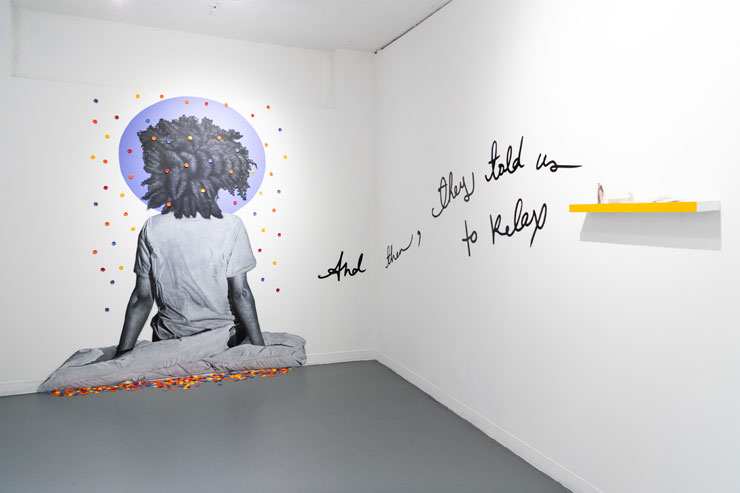
"Be Still" (2023) by Chris Friday at the "Good Times" exhibition at Oolite Arts. (Photo courtesy of Alejandro Chavarria/WorldRedEye.com)
"I feel like we (as Black artists) overshare too much in an effort to convince the general public in our humanity. We share too many intimate details. I want us to take more thought towards what we share and how much of ourselves we are sharing," says Friday.
Which brings us to how it all changed with Floyd. "For 24 hours, the entire world knew that what they were watching was wrong and then came the rhetoric . . . from police reports stating something different than what we saw. Or debates about if 'he had just complied.' I spent a great part of six months after that incident in arguments with family and friends."
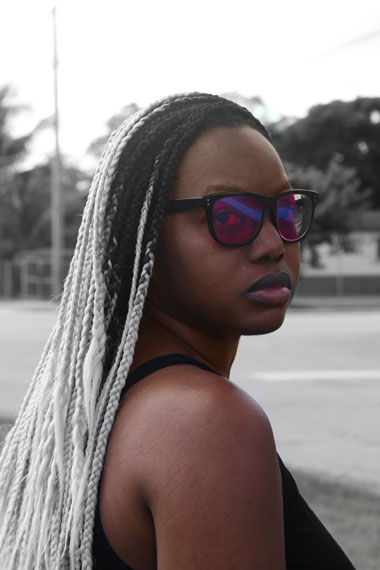
Multidisciplinary artist and Oolite resident artist Chris Friday. (Photo courtesy of the artist)
Friday says that seeing the very public attention and artworks depicting Black deaths made her do some soul searching. "The media is already showing all this. Why do we have to do that in our work? We're just depicting pain and suffering."
In her 2021 chalk on black archival paper, "20 Feet Tall," a woman lays outstretched on her side, only the back of her is showing. It is a sleeping body. "It was me taking a rest. I was so very tired," she says of that time.
After that, her work began to take on the feeling of what she describes as: "I don't want to tell you everything. I don't want to have to explain anything or argue with you. I just want to exist in a public way and not be bothered."
Novoa writes that "the deliberate gesture of turning away is a consistent element in Friday's recent drawings. This 'quotidian practice of refusal' involves limiting knowledge to something or someone, and is therefore an overt and defiant expression of the unwillingness to comply with the expected or the required."
One of the works that catches your eye immediately in entering the space is a colorful triptych of a dancing Black man. He's happy, although you can only see that through his movements, his back is to the viewer. The first of the trio shows his movement with a blue background, the second in yellow and the third, in red.
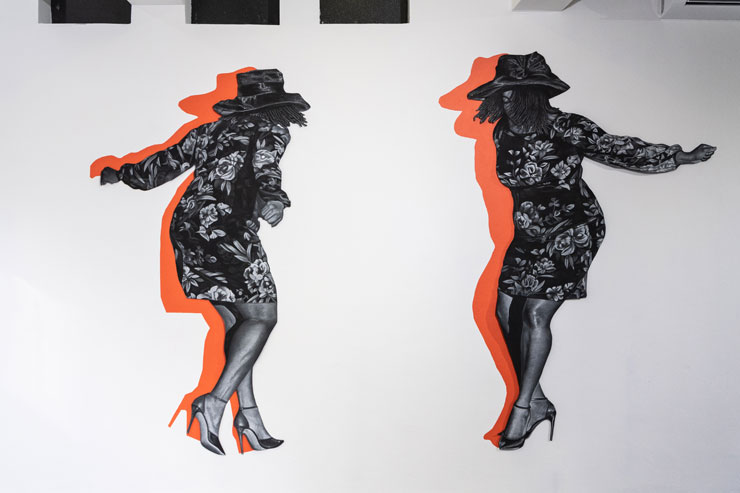
Detail of "Lemon Pepper Steppers" series (2023) by Chris Friday at the "Good Times" exhibition at Oolite Arts. (Photo courtesy of Alejandro Chavarria/WorldRedEye.com)
"Some people will get the message and other people might just say it's a nice triptych," says Friday.
I ask what the message is. She volleys the question back to me. "What do you think it is? What do you think he is doing?"
"From my space," I tell her, "it reminds me of Bojangles." Bojangles was Bill Robinson, the African-American tap dancer, who appeared in so many Shirley Temple movies in the 1930s.
"If that's what you take, that's exactly what you are supposed to take. That's where my work is right now – whatever you can take, take that," explains Friday.
Novoa tells me: "This slight turning away – it doesn't seem forced the way the woman moves her hair or the man is moving his hips side to side with his back toward you."
We talk about the title of the show, "Good Times," and the duality that the title is meant to convey. "The politics of display and how artists, and especially artists of color and Black artists have to put themselves on display to make themselves more palatable or more presentable or more relatable. That's the kind of 'play' we had with 'Good Times,' " says Novoa.
It's a nod to the 1970s sitcom about a family's struggles while living in Chicago's Cabrini Green high rise projects. Friday sings a few of the lyrics: "Temporary lay offs, good times . . . scratching and surviving, good times.' "
"Good times? Those are not really good times," she says and addresses the duality of the title. "They live in the projects, but they still had good times. I don't want it all to be positive or to pretend that bad things aren't there. We live in American society and that has its duality as well. We live in a good country, but it sucks at times. But sometimes you have to ignore things in order to have a good time and there's this small reminder that they are dancing and having fun, but it's in spite of the bad things that can be all around them."
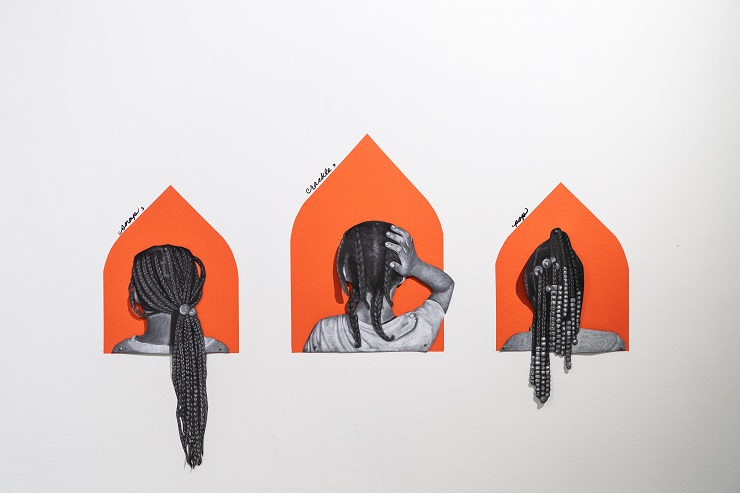
One of Chris Friday's works in the "Good Times" exhibition at Oolite Arts. (Photo courtesy of Alejandro Chavarria/WorldRedEye.com)
Novoa says that there's also the dual role of how humor played in the sitcom – "humor as a defense mechanism and as a way to make Black people more relatable to white audiences."
In one of two rooms, there's "Be Still." A Black girl, her head is encircled in a purple halo, with colorful ceramic flowers all around her on the wall and on the floor as the drawings of the pillows she leans on seem to converge with the ceramics strewn across the baseboard. Friday has handmade each of the hundreds of colorful ceramics meant to represent flowers from her childhood and the barrettes that Black girls wore in their hair. Again, she speaks of duality. "The good memories of the barrettes that adorned our hair back then." Written on the wall in scripted handwriting is the phrase," And then, they told us to relax."
The duality present is that the relaxers used for Black hair damaged it. "It did it to my entire generation. Women that I grew up with, we all lost our hair."
In another room, across from "Be Still," a black and white recording plays on an older model JVC TV. It's Friday's grandmother telling her life story. You don't see her face as she speaks, her head a bit down. "She keeps her identity to herself even though she is telling her personal stories and even though she is sharing it in a public space," the artist says.
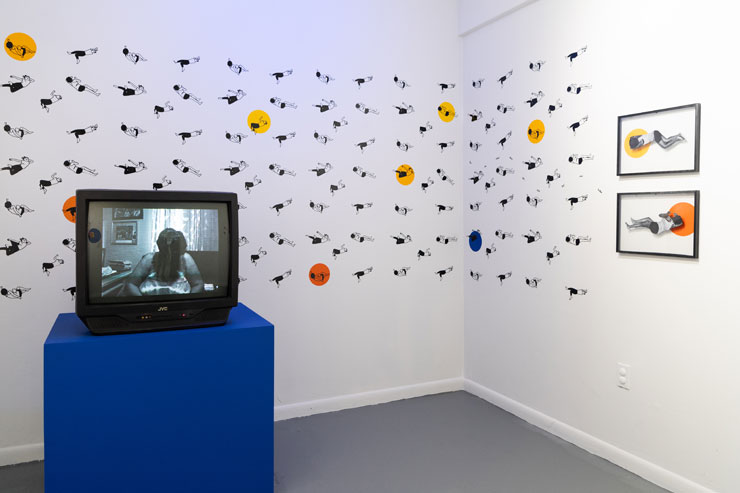
"Comfort Food" (2023) by Chris Friday at the "Good Times" exhibition at Oolite Arts. (Photo courtesy of Alejandro Chavarria/WorldRedEye.com)
"This protection of privacy and intimacy of these figures is really an interesting choice and definitely Friday has done so throughout her practice and in her latest series. I find it poetic, but also a very interesting stance against how an artist and especially an artist of color feels that they have to put everything every on display. So, that to me makes it poignant and beautiful," says Novoa.
Dennis Scholl, president and CEO of Oolite Arts, responds to Friday's art in the catalogue for "Good Times."
Scholl writes: "Chris Friday is an artist whose works claim space and demand presence. Utilizing a variety of media and materials and combining both personal narratives and popular culture, Friday's artistic practice is thoughtful and powerful."
Friday is one of Oolite Arts resident artists and Novoa says that for the organization to give her a solo resident show speaks volumes. "It signifies what is important to them and how they want to represent their artist community."
The figures on the show, Friday reveals, are based on her immediate family and close friends. "That's another part of it – they do know who they are, but we don't." She also says she wants to put a "program of loyalty into the sale of the work." The idea that some of the profit would benefit the model. "That's different traditionally in America from the sale of Black bodies."
"Chris Friday: Good Times" is at Oolite Arts, 924 Lincoln Road, through Sunday, April 2. Hours noon to 5 p.m. daily. For information, call 305-674-8278 and oolitearts.org.




